Zhejiang Geely Holding Group Co. has taken the initiative to lower fuel consumption as it declares to target 90 percent of sales of new-energy vehicles by 2020, ahead of a government-mandated deadline.
The company said in a statement on Wednesday, Nov. 18, that about two-thirds of its sales of new-energy vehicles by the end of the decade will come from plug-in hybrids and gasoline-electric hybrids, with the remaining from battery-electric vehicles.
China has set a deadline for automakers to lower the average fuel consumption of their models from 6.9 liters per 100 kilometers this year to no more than 5 liters per 100 km by 2020.
"Geely is officially stating that it will be the first automotive company in China to reach the government's vision for a 5 liter/100 km fuel directive by 2020," An Conghui, president of Zhejiang Geely, said in the statement. "We aim to allow consumers to realize their dream of driving powerful, extremely fuel-efficient vehicles."
According to the report, Chinese carmakers are developing hybrid and electric vehicles to comply with the fuel economy improvements required by the government. The development of EVs was initiated by China as a strategic initiative and as part of a broader thrust to lead in the automotive technology, curb pollution and reduce dependence on imported oil.
Last month, the government vowed to boost subsidies to speed up the building of recharging stations. It also prohibited cities from imposing restrictions on the purchase of new-energy vehicles.
Geely, which has been developing vehicles with Volvo Cars, said that it aims to make "substantial progress" on fuel-cell vehicles by 2020. On Wednesday, the company started selling its first electric car for a price of 228,800 yuan ($35,875), before government subsidies of about 108,000 yuan.
The report said that Geely plans to offer its plug-in hybrid models at prices equivalent to conventional gasoline-powered vehicles by 2020.
An insider said that Geely has enough capital to finance the development of alternative-energy vehicles and has no financing plans.
A report by Bloomberg Intelligence said that high costs, limited driving ranges and a shortage of charging facilities hold back consumers from buying electric vehicles.






















